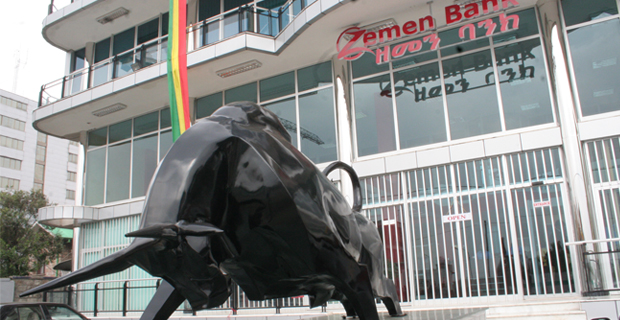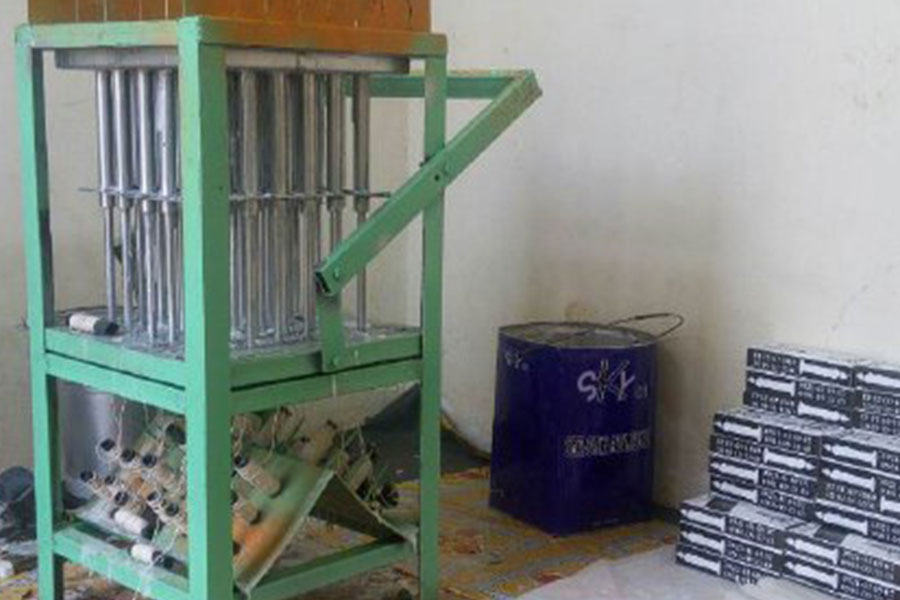
Fortune News | Jan 12,2019
When Yoseph Kassahun, 28, graduated from Addis Abeba University with a degree in civil engineering seven years ago, he had already decided to pursue a career unrelated to his field of study. Instead, he chose to form a film production company, Salkan, in 2016. His company went on to produce nine films in Amharic. In due time, Yoseph had the idea to open a cinema where he could showcase his production as well as others in Ethiopia's nascent film industry.
In the busy Megenagna neighbourhood, he chose Bethlehem Plaza as the site for his new venture, paying 120,000 Br in monthly rent.
He rented the seventh floor of the building and opened the cinema there in early last year with an investment of half a million Birr. The timing could not have been any worse, for it coincided with the advent of the COVID-19 pandemic, which dealt a painful blow to the already-troubled movie industry.
In April 2020, a month after the first case was reported in the country, the government declared a state of emergency. Public gatherings were banned, including at cinema halls, which were forced to close their doors. Yoseph was devastated. His investment had all but dissipated.
Yoseph was left waiting for the pandemic to subside to reopen the doors to his new cinema, which had did not even have a name. He ended up waiting seven months before he could do so. Even then, he could only use half of his cinema's seating capacity of 305.
Yoseph began screening films three times a day in September, charging filmgoers 50 Br a ticket. The feature film he produced, dubbed Yefikir Tig, was a venture that turned out to be a disappointment to Yoseph.
"The audience wasn't that bad," Yoseph told Fortune. "It wasn't adequate."
He had hoped that as time went by, the audience would grow, and he would start to see his investment pay off. For months, the cinema saw a maximum of 30 ticket sales a single viewing and, sometimes, not a single customer would show up.
"It was hopeless," he said.
Cinema Empire in Piassa is one of the theatres under the Cinema Administration Enterprise, which recorded losses of a quarter of a million Birr last year.
Yoseph's is a cheerless debut in the creative industry not peculiar to Ethiopia. The pandemic pummeled the global film industry, causing a 71.5pc fall in box office revenues in the United States last year. It is a loss of over 32 billion dollars, according to OMDIA, a media and tech research firm. The revenues of movie theatres in the United States saw a nine billion dollar fall compared to the preceding year.
The growing use of streaming and accessibility of movies in digital platforms is largely responsible for the diminished appetite film enthusiasts show for going to theatres. In sharp contrast with trends, movies once difficult to access are easily and conveniently found on devices and apps from the comforts of home. The rise of movie piracy makes it easy for users to download or stream domestic and box-office movies minutes after their release. Thousands of cinema theatres have been closed, with the pandemic accelerating their demise, leading the global movie industry to lose up to 97.1 billion dollars a year.
Cinemas in Ethiopia were not immune. Of the over 38 received permits from the Addis Abeba Culture & Tourism Bureau, almost half have not renewed permits, and the remaining are on the verge of collapse. While the growth of legitimate and illicit streaming service providers might comfort viewers, it comes at a cost. Professionals whose livelihoods depend on it are left holding the short end of the stick.
Close to 30 movies were released through the Ethiopian Film Producers Association since the state of emergency was lifted late last year, a significant decline from three years ago when almost 100 movies were released yearly.
State-owned theatres, such as Empire, Ethiopia and Ambassador, are not faring any better than Yoseph's short-lived venture.
The Cinema Administration Enterprise is in charge of the daily operations of these theatres, overseeing a workforce of 94. Its officials report that audience has fallen sharply since they were allowed to reopen in September 2020, often forced to cancel shows. Even state support in the form of 2.5 million Br granted last year has done little to ease their problems. Neither has the waiving of a 60,000 Br fee paid by producers wishing to screen their movies done much good.
Rent remains their largest expense, with Ambassador Cinema and Cinema Ethiopia paying 21,000 Br and 51,000 Br monthly to the Federal Housing Corporation, respectively. Ticket sales are not nearly adequate to cover rent and operations costs. The Enterprise reported losses of a quarter of a million Birr last year.
Elias Mengistu, marketing manager at the Enterprise, attributes the losses to the advent of digital streaming in addition to the consequences of the pandemic.
"Movies get more views on YouTube," says Elias.
It is a view difficult to dismiss.
As internet access expands, viewers turn to streaming services for entertainment. Streaming services have proliferated in recent years, capitalising on the 25 million data and internet subscribers by June this year, according to data from Ethio telecom, the country's sole internet service provider.
Arada Movies, a YouTube channel, is a popular digital destination for Ethiopian film enthusiasts to get their fill. Film producers now prefer to upload movies directly to the channel, with over 620,000 subscribers and almost a quarter of a billion aggregate views. Sodere TV, another channel streaming Ethiopian movies, has almost half a million subscribers and over 45 million aggregate views.
Both channels uploaded 20 movies in half a year, far better than what even pioneer cinema houses screened since the lifting of the restriction due to the pandemic.
Alem Cinema is one of the pioneers in the film industry. A property of Haile & Alem International Plc, the cinema on Africa Avenue (Bole Road) has been operating for close to two decades. It features two halls with seating capacities of 700 each and has up to five showtimes a day, employing 15 people. Business is recovering, although the numbers are not level with pre-pandemic viewership.
"There are signs of recovery," says Elias Yoseph, manager at Alem Cinema.
Since its reopening in September this year, Alem Cinema screened 22 domestically produced movies, almost two-fold lower than what Arada and Sodere offered during the same period. According to Elias, the number of movies screened at Alem would be closer to 60, a situation he believes could improve if movie producers do a better job at promotion. Alems Cinema's slack partly comes partly due to its management not being burdened by rental fees as its parent company owns the property.
Cinemas with modern visual and sound systems are still in recovery mode.
Opened in March 2018 with an investment of 255 million Br, Gast Cinema features five halls with seating capacities ranging up to 240. Located in the CMC area, the cinema caters to those looking to enjoy foreign films, mostly Hollywood-produced. Gast sources its films from agents in Dubai, sharing revenues with these agents, sometimes giving up as much as 80pc.
Tickets at Gast go for between 120 Br to 350 Br; yet, the management reports seeing more people coming than September last year. But there is a long way to go before a full recovery.
"Because of COVID-19 protocols, over half of the seats remain unsold," said Solomon Atsbeha, general manager of the cinema.
The advent of international streaming platforms such as Netflix and Amazon Prime, having over a quarter of a billion subscribers each, has further affected their business, prolonging their recovery while discouraging new entrants like Yoseph from having another go.
But blaming the COVID-19 pandemic and the advent of online streaming for what ails the domestic cinema industry could be misleading.
Yoseph believes the low-quality production is also to blame.
Instability in the country has harmed the film industry. While the tense political situation across regions reduces moviegoers' appetite for going to cinema theatres and watching a movie, it has prevented film producers from making movie tours, which was a major source of revenues in the past.
Binyam Alemayehu presides over the Ethiopian Film Producers Association, established a decade ago and has over 150 members. He sees the conflicts ongoing in the country limiting the number of movies producers, hence directly affecting the cinema business.
PUBLISHED ON
Sep 10,2021 [ VOL
22 , NO
1115]

Fortune News | Jan 12,2019

Editorial | Aug 20,2022

Fortune News | Jun 10,2023

Sunday with Eden | Feb 29,2020

Fortune News | Aug 28,2021

Covid-19 | Apr 03,2020

Featured | Apr 26,2019

Fortune News | Aug 12,2023

Commentaries | Jun 22,2024

Featured | Nov 23,2019

Dec 22 , 2024 . By TIZITA SHEWAFERAW
Charged with transforming colossal state-owned enterprises into modern and competitiv...

Aug 18 , 2024 . By AKSAH ITALO
Although predictable Yonas Zerihun's job in the ride-hailing service is not immune to...

Jul 28 , 2024 . By TIZITA SHEWAFERAW
Unhabitual, perhaps too many, Samuel Gebreyohannes, 38, used to occasionally enjoy a couple of beers at breakfast. However, he recently swit...

Jul 13 , 2024 . By AKSAH ITALO
Investors who rely on tractors, trucks, and field vehicles for commuting, transporting commodities, and f...

Oct 11 , 2025
Ladislas Farago, a roving Associated Press (AP) correspondent, arrived in Ethiopia in...

Oct 4 , 2025
Eyob Tekalegn (PhD) had been in the Governor's chair for only weeks when, on Septembe...

Sep 27 , 2025
Four years into an experiment with “shock therapy” in education, the national moo...

Sep 20 , 2025
Getachew Reda's return to the national stage was always going to stir attention. Once...